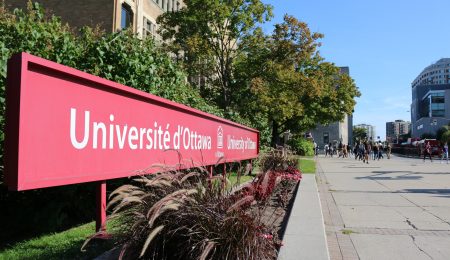Board of Governors discusses finances, academic reputation, and more
On Monday, Sept. 25 the University of Ottawa’s Board of Governors (BOG) met to discuss its latest financial numbers, the university’s academic ranking, and more. Kathryn Butler Malette opened the meeting for her first time as chair, replacing long-standing meeting-runner Robert Giroux. The first item on the agenda was a review of the previous year’s finances, presented by Marc Joyal, the vice-president resources at the U of O.
Review of finances
Joyal told the board that the university ran a $5.1 million deficit during the 2016-17 academic year, in line with the $4.9 million expected deficit. Keeping the deficit this low was done with great effort on the part of the university and its staff, and there were points last year where he feared the deficit could climb as high as $15 million.
Last winter, the university announced a series of cost-cutting measures, including the restriction of discretionary expenses like travel, a reduction in construction, and a hiring freeze for some job categories at the university.
Joyal said that the university isn’t out of the woods yet. In his presentation, he highlighted that tuition and government grants, which together make up nearly 100 per cent of the university’s funding, are covering less and less of the university’s costs.
According to Joyal, expenses grew by around 12 per cent more than revenues this year, a trend he said must be reversed by either increasing revenues or decreasing expenses.
Joyal added that many of the funds the university has are restricted. For example, some funds can only be used for specific research. He also listed the university’s endowment fund, where the money cannot be used, only the interest it generates, and the university’s “sinking fund” which is designed to be used in the future to pay off long-term debt.
President’s report
U of O president Jacques Frémont spoke broadly on the university’s new projects, and the state of the school in general.
Frémont said in order to deal with the growing opioid crisis, the university had purchased naloxone kits and has been working with Ottawa Public Health on a broad strategy. While there have been no incidents of overdose, Frémont noted that there is a growing use of opioids on campus.
Frémont then discussed the university’s negotiations with the Ontario government over their new Strategic Mandate Agreement (SMA), where the university outlines its goals and commitments to the province. The previous version expires this year, and a new agreement is being negotiated. Frémont said that this year he was pushing for the province to make more commitments in the SMA to the U of O. While the process has been slow, it is proceeding.
The president also talked about the university’s ranking. While he said that many people deem the reports useless, potential students read them, especially international students,so the university must pay attention. While the university generally does well in research-related categories, it suffers in more arbitrary “reputation” categories. When asked about the university’s plan to improve, Frémont said there are many factors that go into reputation so there is no specific plan.
The next BOG meeting will be on Oct. 30 at 5:30 p.m. in Tabaret 083. Meetings are open to the public.





